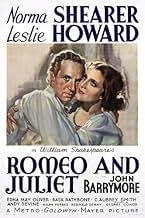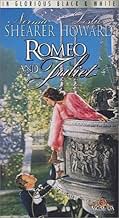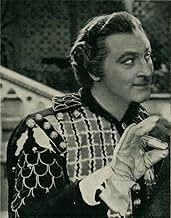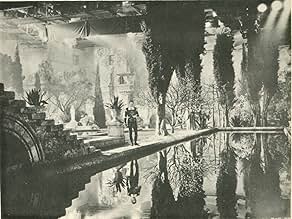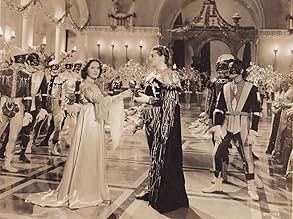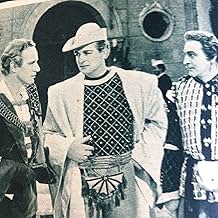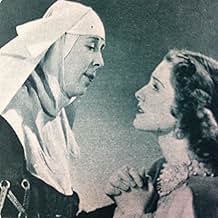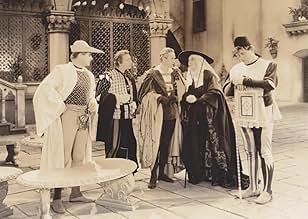NOTE IMDb
6,5/10
2,4 k
MA NOTE
Ajouter une intrigue dans votre langueYoung love is poisoned by a generations long feud between two noble families.Young love is poisoned by a generations long feud between two noble families.Young love is poisoned by a generations long feud between two noble families.
- Réalisation
- Scénario
- Casting principal
- Nommé pour 4 Oscars
- 4 victoires et 5 nominations au total
Charles Bancroft
- Nobleman
- (non crédité)
Dean Benton
- Minor Secondary Role
- (non crédité)
Carlyle Blackwell Jr.
- Tybalt's Page
- (non crédité)
John Bryan
- Friar John
- (non crédité)
Avis à la une
For years, I put off watching this version of Shakespeare's classic love story, knowing that all the main players were about thirty years too old for their roles. Finally, when the film came on late on night, I decided to take a look, because I do admire the work of so many of the players.
Provided you can put aside the problems of the ages of the actors, the result is a very pleasant surprise. The biggest surprise for me was the performance of Norma Shearer - I've always liked her work, but considered her rather lightweight for Shakespeare. Not so - she delivered her lines with a great feel for the style and pace, and was as delightful and open a Juliet as one could wish. Her age became irrelevant; this was a young girl new to love, completely swept off her feet and ready to surrender all - for the first time.
Leslie Howard was also comfortable with the Shakespearean dialogue, if slightly lacking the boyish passion we rightly expect to see. He was more the slightly older suitor, taken by surprise with the fresh appeal of his Juliet, but ready to cast aside previous attachments to pursue and win her. His lovely voice delivered the lines with ease and fluency.
John Barrymore's Mercutio was much more the ageing playboy than the dashing young blade, but his sure touch with the dialogue showed clearly why he was considered the preeminent Shakespearean actor of his day in America. His delivery of the "Queen Mab" speech was a delight. His body was way too old, but his spirit lacked nothing.
Flora Robson came near to stealing most of her scenes, as she so often did, and Basil Rathbone was fully at home in the role of Tybalt; fine performances from these two, as we would expect from their backgrounds.
It was, to my mind, rather over-produced, with the actors in danger of being lost in the expansive sets, but remembering that had these actors been performing on stage, we wouldn't bat an eyelid at their ages, they provide us with an engrossing experience and deliver a play that even the experts couldn't fault.
Provided you can put aside the problems of the ages of the actors, the result is a very pleasant surprise. The biggest surprise for me was the performance of Norma Shearer - I've always liked her work, but considered her rather lightweight for Shakespeare. Not so - she delivered her lines with a great feel for the style and pace, and was as delightful and open a Juliet as one could wish. Her age became irrelevant; this was a young girl new to love, completely swept off her feet and ready to surrender all - for the first time.
Leslie Howard was also comfortable with the Shakespearean dialogue, if slightly lacking the boyish passion we rightly expect to see. He was more the slightly older suitor, taken by surprise with the fresh appeal of his Juliet, but ready to cast aside previous attachments to pursue and win her. His lovely voice delivered the lines with ease and fluency.
John Barrymore's Mercutio was much more the ageing playboy than the dashing young blade, but his sure touch with the dialogue showed clearly why he was considered the preeminent Shakespearean actor of his day in America. His delivery of the "Queen Mab" speech was a delight. His body was way too old, but his spirit lacked nothing.
Flora Robson came near to stealing most of her scenes, as she so often did, and Basil Rathbone was fully at home in the role of Tybalt; fine performances from these two, as we would expect from their backgrounds.
It was, to my mind, rather over-produced, with the actors in danger of being lost in the expansive sets, but remembering that had these actors been performing on stage, we wouldn't bat an eyelid at their ages, they provide us with an engrossing experience and deliver a play that even the experts couldn't fault.
This production got glitsy treatment by production head Irving G. Thalberg, who was showcasing his wife, Norma Shearer, playing Juliet: two years of research, a crew sent to Verona to photograph parts of the city; reconstruction of Verona's Church of San Zeno on the back-lot; thousands of extras; beautiful costumes and sets, etc. Although the screenplay was shortened, Thalberg also insisted that only Shakespeare's words were to be used in the dialogue. That would be a pleasure for those who knew the play, but a bane for those who didn't. Shakespeare's spoken dialogue isn't very easy to understand. Like any foreign language you learned a little bit in school, you can translate written material and get the gist of what is going on, but try deciphering normal speech in that language and you will be lost. I had a difficult time understanding some of the speeches (almost nothing that John Barrymore was saying) - they flew by me too fast. (On the other hand, I studied Hamlet and Macbeth in school and relish watching movie versions of those plays.) Still, I enjoyed this film, since I knew the general story, and there were sections that didn't tax my knowledge of Shakespearean English. Some of the lines were beautiful. I never new that the expression "star-crossed lovers" was Shakespeare's. Edna May Oliver's comedy was superbly played and the acting of the rest of the cast was excellent. The title characters were supposed to be teenagers, so that both Leslie Howard (at 54) and Norma Shearer (at 31) were a bit old for their parts, but that was a minor point. My advice to anyone wishing to watch this film: read the play first!
ROMEO AND JULIET, the scions of old Verona's two most powerful families, become the playthings of fate & the fools of fortune.
This was a Very Big Film for MGM in 1936. No (reasonable) expenses spared. Not only was the Studio tackling The Bard for the first time in a major way, but the extreme celebrity of the original play guaranteed a great deal of public attention. Several choice roles were available for MGM's brightest stars and the part of Juliet would be the desire of every young actress on the lot.
Almost predictably the role went to Norma Shearer, who, as Irving Thalberg's wife, could almost pick & choose what she (or Irving) wanted. However, it should be stated at once that she is splendid in the role. Sweetly demure, innocent, apprehensive, fiercely protective of her love & recklessly heedless of her fate - she is Shakespeare's heroine.
She is matched by Leslie Howard's Romeo. A bit giddy at first with puppy love, he quickly matures into a tender lover & vengeful killer, finally willing, like Shearer, to forego all of his Catholic teaching and commit self-murder, thus dooming himself to Perdition.
Although decades too old for their roles (Juliet was 12, Miss Shearer 34; Romeo about 16, Mr. Howard was 43) they understand and speak their lines much more beautifully & proficiently than any teenager. Shakespeare's lines are really verse of a high order and demands skill & maturity. Howard & Shearer certainly have no problem there. Nor were they the only members of the cast whose ages were rather past the prime.
In his only feature length Shakespearean film, John Barrymore amply displays his celebrated talent in a bravura performance as an aging, sottish Mercutio. Barrymore understood the character thoroughly and he turns this strange, brilliant man into one of the film's chief treasures. Interestingly, much of his dialogue is rather scatological & gross, but being Shakespeare it seems to have flown under the radar of the Hays Office.
Edna May Oliver steals nearly every scene she's in as Juliet's waspish, eccentric Nurse. Basil Rathbone makes a fiery, insolent Tybalt. Reginald Denny adds a touch of distinction in the throwaway role of Benvolio, while wonderful old Sir C. Aubrey Smith & Violet Kemble Cooper are colorful as Juliet's parents.
At first blush, Andy Devine seems an odd choice for a Shakespearean production, but he is very competent as the Nurse's simpleminded servant.
Somewhat lost in this excellent cast is English actor Ralph Forbes in the rather thankless role of the County Paris. His is a somewhat sad story. Although replete with talent & charm, he still never quite reached the top echelons of stardom. He would have made a great Romeo.
Movie mavens will spot Katherine DeMille as the fair Rosaline (her cousin Agnes de Mille was the film's choreographer) and Ian Wolfe as the impoverished apothecary, both uncredited.
The film has wonderful production values - the sets, costumes and background score (borrowing themes from Tchaikovsky) all of the highest quality. For a small chuckle, watch closely during Juliet's dance at the Capulet ball - one of the dancers behind her steps on her dress hem and nearly trips. It's very fast, but worth catching.
This was a Very Big Film for MGM in 1936. No (reasonable) expenses spared. Not only was the Studio tackling The Bard for the first time in a major way, but the extreme celebrity of the original play guaranteed a great deal of public attention. Several choice roles were available for MGM's brightest stars and the part of Juliet would be the desire of every young actress on the lot.
Almost predictably the role went to Norma Shearer, who, as Irving Thalberg's wife, could almost pick & choose what she (or Irving) wanted. However, it should be stated at once that she is splendid in the role. Sweetly demure, innocent, apprehensive, fiercely protective of her love & recklessly heedless of her fate - she is Shakespeare's heroine.
She is matched by Leslie Howard's Romeo. A bit giddy at first with puppy love, he quickly matures into a tender lover & vengeful killer, finally willing, like Shearer, to forego all of his Catholic teaching and commit self-murder, thus dooming himself to Perdition.
Although decades too old for their roles (Juliet was 12, Miss Shearer 34; Romeo about 16, Mr. Howard was 43) they understand and speak their lines much more beautifully & proficiently than any teenager. Shakespeare's lines are really verse of a high order and demands skill & maturity. Howard & Shearer certainly have no problem there. Nor were they the only members of the cast whose ages were rather past the prime.
In his only feature length Shakespearean film, John Barrymore amply displays his celebrated talent in a bravura performance as an aging, sottish Mercutio. Barrymore understood the character thoroughly and he turns this strange, brilliant man into one of the film's chief treasures. Interestingly, much of his dialogue is rather scatological & gross, but being Shakespeare it seems to have flown under the radar of the Hays Office.
Edna May Oliver steals nearly every scene she's in as Juliet's waspish, eccentric Nurse. Basil Rathbone makes a fiery, insolent Tybalt. Reginald Denny adds a touch of distinction in the throwaway role of Benvolio, while wonderful old Sir C. Aubrey Smith & Violet Kemble Cooper are colorful as Juliet's parents.
At first blush, Andy Devine seems an odd choice for a Shakespearean production, but he is very competent as the Nurse's simpleminded servant.
Somewhat lost in this excellent cast is English actor Ralph Forbes in the rather thankless role of the County Paris. His is a somewhat sad story. Although replete with talent & charm, he still never quite reached the top echelons of stardom. He would have made a great Romeo.
Movie mavens will spot Katherine DeMille as the fair Rosaline (her cousin Agnes de Mille was the film's choreographer) and Ian Wolfe as the impoverished apothecary, both uncredited.
The film has wonderful production values - the sets, costumes and background score (borrowing themes from Tchaikovsky) all of the highest quality. For a small chuckle, watch closely during Juliet's dance at the Capulet ball - one of the dancers behind her steps on her dress hem and nearly trips. It's very fast, but worth catching.
While I was looking for new materials to help teach "Romeo and Juliet," I found the 1936 version of the play and naturally I was intrigued. I'm assuming that most people know the basic plot and have seen other versions of the film, if this is not the case you may want to stop reading and keep the surprise for viewing.
This version is faithful if not to the exact order of all the dialogue then to the acts and scenes written by Shakespeare. For those teachers that are looking for a version that explains how the letter from Friar Lawrence never reaches Romeo and the reaction of the local populace to "Plague," this is the version that does it very well. Not only do we learn why Friar John never gets to Romeo but we also get the death duel between Romeo and Paris, a scene that has been cut out of every other version I've seen. Plus we get the closing moment of peace between the families. However, the death of Lady Montague is omitted.
The movie leaves a little to be desired by modern audiences and the typical class of high school freshman many need some heavy prep work to get them ready to view "black and white" and "old" as something other than "lame." But, I think that segments of the film would be well worth showing to the class and viewed as a treat and not a torture when it's not the whole product being shoved down in one lump.
I recommend checking it out as an additional resource to add a balanced movie perspective to the characters Shakespeare created. The main problem with it is the age of the actors playing the parts of all these young people. Leslie Howard is 40 years old. Norma Shearer must be of a similar age and it shows in some of the scenes. The age of the people supposedly playing teenagers does strain credibility and at times the acting leaves a lot to be desired. They don't convincingly play "passion." You can chalk the overall feeling of muted emotion to the era because at times the emotions do come through brilliantly.
This version is faithful if not to the exact order of all the dialogue then to the acts and scenes written by Shakespeare. For those teachers that are looking for a version that explains how the letter from Friar Lawrence never reaches Romeo and the reaction of the local populace to "Plague," this is the version that does it very well. Not only do we learn why Friar John never gets to Romeo but we also get the death duel between Romeo and Paris, a scene that has been cut out of every other version I've seen. Plus we get the closing moment of peace between the families. However, the death of Lady Montague is omitted.
The movie leaves a little to be desired by modern audiences and the typical class of high school freshman many need some heavy prep work to get them ready to view "black and white" and "old" as something other than "lame." But, I think that segments of the film would be well worth showing to the class and viewed as a treat and not a torture when it's not the whole product being shoved down in one lump.
I recommend checking it out as an additional resource to add a balanced movie perspective to the characters Shakespeare created. The main problem with it is the age of the actors playing the parts of all these young people. Leslie Howard is 40 years old. Norma Shearer must be of a similar age and it shows in some of the scenes. The age of the people supposedly playing teenagers does strain credibility and at times the acting leaves a lot to be desired. They don't convincingly play "passion." You can chalk the overall feeling of muted emotion to the era because at times the emotions do come through brilliantly.
Although there were a number of silent versions of Shakespeare plays, and the first direct screen adaptation of his work was in 1929 with the (incidentally very entertaining) Fairbanks/Pickford Taming of the Shrew, it wasn't until the mid-1930s that Hollywood really set its sights on the Immortal Bard. The industry had emerged triumphant from the coming of sound, the worst years Depression and the enforcement of the production code, and now was the time to scale new heights.
Now, Shakespeare was great, and 30s Hollywood was also great, but in a very different way. The two were not entirely incompatible, but there was certainly a lot of scope to get things wrong. And one of the worst things to go wrong in this particular example is casting. A year earlier Warner Brothers had thrown decorum to the winds and simply lined up their usual rogues gallery of wisecrackers for a wild and surprisingly effective edition of A Midsummer Night's Dream. MGM however seemed keener to preserve a sense of theatrical propriety and chose actors for their credentials and experience.
Experience comes with age, and that is really the biggest single problem with these two star-crossed lovers. Norma Shearer gives a powerful and emotionally realistic performance, but she has the demeanour of a woman who has seen a bit of life, as opposed to a girl embarking on her first romance. Lesley Howard would actually make quite a good Romeo, he has the right honest bearing and simple handsomeness, but really he would have to be at least ten years younger. One might argue that if their acting is strong enough, surely we can stretch the imagination a little and overlook their years. This can and does work in some pictures (for example Anne Bancroft only being a little older than Dustin Hoffman in The Graduate), but for Romeo and Juliet it essential that we get that impression of flighty, passionate young lovers whose eventual demise is a tragic waste of life.
But there is worse yet than Shearer and Howard. The very acme of bad casting is here represented by John Barrymore as Mercutio. Don't get me wrong, Barrymore is comically eccentric, but Mercutio is supposed to be a sly young rake, not some jolly middle-aged lecher. And remember the character was named after his mercurial temperament (meaning quickly changing mood), yet Barrymore is just incessantly merry. Mercutio's greatest moment – the Queen Mab speech – is reduced to a wittering ramble. Another mistake of the casting couch was Andy Devine as Peter the servant. Devine is funny, and could even have been an asset in a Shakespearean comedy, but he is not right here. There are meant to be a few laughs in Romeo and Juliet, but not from some inept twerp. His inclusion in the opening brawl (the lines he speaks here belong to another character) is ridiculous, and sets absolutely the wrong tone.
This was an Irving Thalberg production, and Thalberg was probably the finest of the old-style producers, having a real knack for putting together the right team and then graciously leaving them to it. It's unlike him to make so many blunders with principle casting, but at least he got a decent crew. George Cukor was a good choice for director, as he was already the best when it came to stage-to-screen adaptations. He fills the earliest scenes with all sorts of bustle and background movement, then makes everything simplified and stripped down as the drama intensifies, focusing everything on the performers. William Daniels's cinematography is stunning, rich in light and shadow, the standout being the dance scene in which Howard is crisply black and Shearer shimmering white, with the background figures a wash of grey. Even on the acting front it's not all bad. Edna May Oliver is spot-on as the nurse, with her almost guttural delivery complementing the character's lewdness. And Basil Rathbone gives a calm, calculated performance, keeping all Tybalt's aggression simmering below the surface.
It was around this time that Laurence Olivier claimed Shakespeare could never work on screen, saying, "The shot is too big for the cannon". Of course, he would soon swallow his words and become the foremost actor, director and producer of Bard movies. His statement was born from the snobbishness of a naïve young theatre devotee, but one can't help thinking that such lukewarm offerings as this Romeo and Juliet only served to back up his opinion.
Now, Shakespeare was great, and 30s Hollywood was also great, but in a very different way. The two were not entirely incompatible, but there was certainly a lot of scope to get things wrong. And one of the worst things to go wrong in this particular example is casting. A year earlier Warner Brothers had thrown decorum to the winds and simply lined up their usual rogues gallery of wisecrackers for a wild and surprisingly effective edition of A Midsummer Night's Dream. MGM however seemed keener to preserve a sense of theatrical propriety and chose actors for their credentials and experience.
Experience comes with age, and that is really the biggest single problem with these two star-crossed lovers. Norma Shearer gives a powerful and emotionally realistic performance, but she has the demeanour of a woman who has seen a bit of life, as opposed to a girl embarking on her first romance. Lesley Howard would actually make quite a good Romeo, he has the right honest bearing and simple handsomeness, but really he would have to be at least ten years younger. One might argue that if their acting is strong enough, surely we can stretch the imagination a little and overlook their years. This can and does work in some pictures (for example Anne Bancroft only being a little older than Dustin Hoffman in The Graduate), but for Romeo and Juliet it essential that we get that impression of flighty, passionate young lovers whose eventual demise is a tragic waste of life.
But there is worse yet than Shearer and Howard. The very acme of bad casting is here represented by John Barrymore as Mercutio. Don't get me wrong, Barrymore is comically eccentric, but Mercutio is supposed to be a sly young rake, not some jolly middle-aged lecher. And remember the character was named after his mercurial temperament (meaning quickly changing mood), yet Barrymore is just incessantly merry. Mercutio's greatest moment – the Queen Mab speech – is reduced to a wittering ramble. Another mistake of the casting couch was Andy Devine as Peter the servant. Devine is funny, and could even have been an asset in a Shakespearean comedy, but he is not right here. There are meant to be a few laughs in Romeo and Juliet, but not from some inept twerp. His inclusion in the opening brawl (the lines he speaks here belong to another character) is ridiculous, and sets absolutely the wrong tone.
This was an Irving Thalberg production, and Thalberg was probably the finest of the old-style producers, having a real knack for putting together the right team and then graciously leaving them to it. It's unlike him to make so many blunders with principle casting, but at least he got a decent crew. George Cukor was a good choice for director, as he was already the best when it came to stage-to-screen adaptations. He fills the earliest scenes with all sorts of bustle and background movement, then makes everything simplified and stripped down as the drama intensifies, focusing everything on the performers. William Daniels's cinematography is stunning, rich in light and shadow, the standout being the dance scene in which Howard is crisply black and Shearer shimmering white, with the background figures a wash of grey. Even on the acting front it's not all bad. Edna May Oliver is spot-on as the nurse, with her almost guttural delivery complementing the character's lewdness. And Basil Rathbone gives a calm, calculated performance, keeping all Tybalt's aggression simmering below the surface.
It was around this time that Laurence Olivier claimed Shakespeare could never work on screen, saying, "The shot is too big for the cannon". Of course, he would soon swallow his words and become the foremost actor, director and producer of Bard movies. His statement was born from the snobbishness of a naïve young theatre devotee, but one can't help thinking that such lukewarm offerings as this Romeo and Juliet only served to back up his opinion.
Le saviez-vous
- AnecdotesThe film contains the only on-screen sword fight that expert swordsman Basil Rathbone won in his entire film career.
- Citations
Juliet - Daughter to Capulet: My bounty is as boundless as the sea, My love as deep. The more I give to thee, The more I have, for both are infinite.
- ConnexionsFeatured in Maître Will (1936)
Meilleurs choix
Connectez-vous pour évaluer et suivre la liste de favoris afin de recevoir des recommandations personnalisées
- How long is Romeo and Juliet?Alimenté par Alexa
Détails
- Date de sortie
- Pays d’origine
- Site officiel
- Langue
- Aussi connu sous le nom de
- Romeo and Juliet
- Lieux de tournage
- Société de production
- Voir plus de crédits d'entreprise sur IMDbPro
- Durée
- 2h 5min(125 min)
- Couleur
- Rapport de forme
- 1.37 : 1
Contribuer à cette page
Suggérer une modification ou ajouter du contenu manquant


